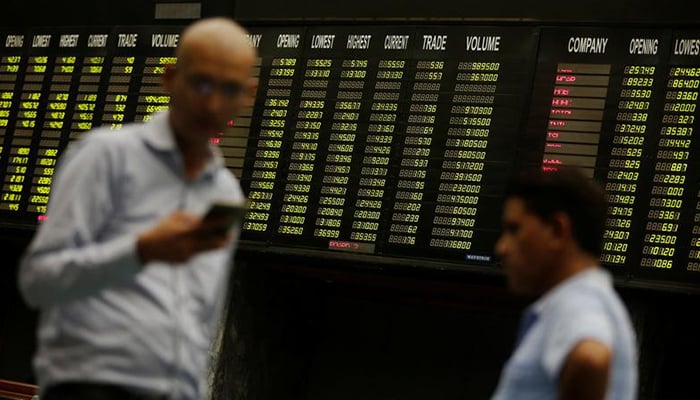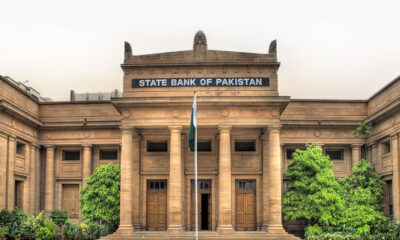KARACHI: Pakistan Stock Exchange (PSX) Monday witnessed a bullish trend as the KSE-100 benchmark index crossed 2,000 points after the government reached a consensus with the International Monetary Fund (IMF) on a bailout package.
The index opened in the green zone and remained positive throughout the session before the trading was halted for an hour after the index hit its upper circuit limit of 5% at around 9:30am. The trading resumed at around 10:37pm.
When the market opened today, after Eid holidays break, it surged a record 2,231.1 points to 43,683.78 points, rising more than 5%, which forced the suspension.
As the trading resumed after an hour’s suspension, the benchmark index surged to 43,923.71 points — an increase of 5.96% or 2471.03 points — at around 11:20am.
Pakistan secured a badly-needed $3 billion short-term financial package — subject to approval by the IMF board in mid-July — on Friday, giving the South Asian economy a much-awaited respite as it teeters on the brink of default.
Speaking to Geo.tv, Pakistan-Kuwait Head of Research Samiullah Tariq said the market is performing due to the IMF deal and the reduction of the uncertainty on the balance of payments front.
The loan is a lifeline for Pakistan as it gives a nine-month roadmap to the nation, which is facing one of its worst economic and political crises on record.
Ecohing Tariq, Arif Habib Limited’s Head of Research Tahir Abbas also said that the rally is primarily due to the staff-level agreement with the IMF.
When asked whether the rally would be short-lived, Abbas said: “No, the momentum and sentiment are very positive given now the country has an economic roadmap ahead for the next nine months.”
The KSE-100 index had become the world’s cheapest equity benchmark, according to Bloomberg, as concerns regarding political turmoil and a risk of default had sent investors fleeing.
Islamabad also faces a payment of $23 billion in external debt obligations during the fiscal year, which started in July — and is almost six times more than the State Bank of Pakistan’s $4 billion forex reserves.
PM felicitates business community
In response to the surge, Prime Minister Shehbaz Sharif felicitated the business community and the nation.
He said as a result of a staff-level agreement with the IMF, the trust of investors and the business community was rapidly reviving.
In a statement issued by the PM Office, Shehbaz said the government’s continued struggle and prudent policies had started bearing fruits as signs of the country’s economic revival were rising.
“We are resuming the journey of economic development and decline in the inflation rate from the point where Quaid Muhammad Nawaz Sharif had left.” he said.
“Thanks to God, the country has been put on the path of development again, he said adding that after severe disappointments, a new sun of hope is rising again.”

 Latest News1 day ago
Latest News1 day ago
 Latest News2 days ago
Latest News2 days ago
 Latest News2 days ago
Latest News2 days ago
 Latest News2 days ago
Latest News2 days ago
 Latest News2 days ago
Latest News2 days ago
 Latest News1 day ago
Latest News1 day ago
 Latest News2 days ago
Latest News2 days ago
 Latest News1 day ago
Latest News1 day ago























